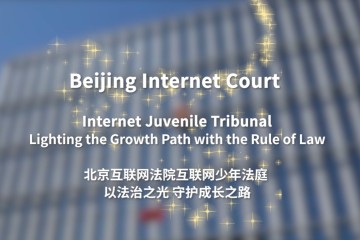Beijing Internet Court's typical cases and highlighted measure included in SPC work report
The work report delivered by Zhou Qiang, president of the Supreme People's Court (SPC), at the Fourth Session of the 13th National People's Congress on March 8 mentioned two typical cases and one highlighted measure of the Beijing Internet Court.
Case one:
The case of alleged damage done to membership rights by video website iQiYi
Regulating business models innovation and protecting users' legitimate rights and interests
Wu, the plaintiff, was a golden VIP member of China's video streamer iQiYi, filed a lawsuit against iQiYi for breaching the terms and conditions of its VIP membership agreement. The plaintiff said the platform had charged an additional fee to watch the popular Chinese period drama "Qing Yunian" — also known as "Joy of Life" — before its release date.
In addition, Wu claimed that although the company had updated its membership agreement, many terms were illegal.
The court ordered iQiYi to pay 1,500 yuan ($210) in legal fees, in accordance with the plaintiff's demands, and added that the company had harmed the interests of the premium subscriber.
The website operator appealed but the higher level court rejected the appeal and sustained the original judgment.
Zhang Wen, chief judge of the case and president of the Beijing Internet Court, said that network service platforms should not damage users' rights whether they arise according to law or agreement. The platforms can hold the right to unilaterally alter the terms and conditions but should fulfill their obligation to not damage other side's rights and interests.
In hearing the case, the court balanced proper protection of the internet industries' future development and users' rights and interests. It emphasized the protection of users' rights on the basis that such protection is necessary given the operators' innovation of business models.
Case two:
The case of WeRead mobile app infringing users' personal information
Strengthening personal information protection and safeguarding data security
Huang had logged onto WeRead through WeChat, two mobile apps run by Tencent. WeRead is a reading app. Huang found that WeChat forced transfer of data of "friend" connections on WeChat to WeRead by not allowing users to log in unless they gave authorization to access the WeChat friend data.
Huang found that he and his WeChat friends could check each others' book shelf, books on reading and their thoughts after reading, whether they added each other as friends in the WeRead app or not.
Huang claimed that the above actions of WeChat and WeRead infringed upon his personal information and privacy rights, and that Tencent, as the developer and operator of the two apps, should bear the corresponding tort liabilities.
Tencent said that WeRead did not automatically add friends to the plaintiff, and its obtaining of the plaintiff's WeChat friends data and showing the reading information to Huang's WeChat friends who also used the app, had required his permission.
The Beijing Internet Court concluded that Tencent didn't inform its users in a reasonably "transparent" way and didn't get effective permissions of the plaintiff, which infringed Huang's rights and interests of personal information. But the court stated that Tencent didn't infringe upon the plaintiff's privacy as Huang's book reading information didn't count as privacy according to the Civil Code in which the concepts of personal information and privacy and their relationship are clearly defined.
Sun Mingxi, chief judge of the case, said it is a typical case to comprehensively discuss, for the first time in an actual judicial practice, the relationship between personal information and privacy according to the Civil Code, which took effect on Jan 1, 2021.
The case made it clear that internet enterprises must obtain the consent of users when transferring user information between related products. When collecting and using users' personal information, the enterprises should inform users in a reasonable way that takes into account the nature of the information and the ways it could be used so that users can clear understand and provide valid consent if they wish.
The judgment of this case is also consistent with the spirit of the Personal Information Protection Law (Draft) released later, which provides a useful reference for the accurate application of personal information and privacy protection in the Civil Code and relevant laws in judicial practice.
One highlighted measure
The internet courts of Beijing, Hangzhou and Guangzhou have continued to reform and explore ways to improve procedural rules, apply technology innovatively, and promote internet law-based governance.
The Beijing Internet Court has been exploring the updates of new technologies' application in the judicial area, and has built a world-leading internet litigation platform. It has heard a number of internet-related cases with rules-guiding significance and formed a series of innovative models of social governance.
Its copyright-Tianping Blockchain synergistic governance platform was regarded as a transformative innovation that enabled by technologies and justice.

 Judicial White Paper
Judicial White Paper
 Play
Play Play
Play Online Lawsuit Guide
Online Lawsuit Guide Beijing Internet Court Lawsuit Service WeChat Account
Beijing Internet Court Lawsuit Service WeChat Account  Beijing Internet Court WeChat Account
Beijing Internet Court WeChat Account